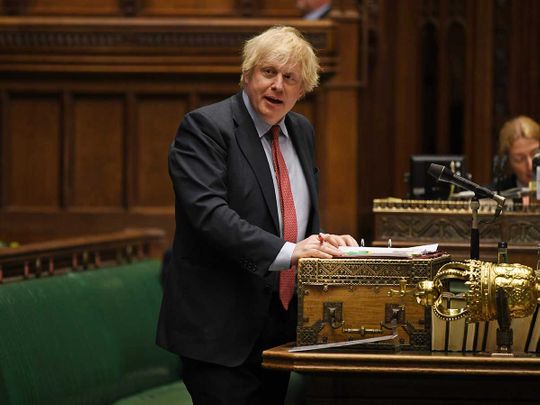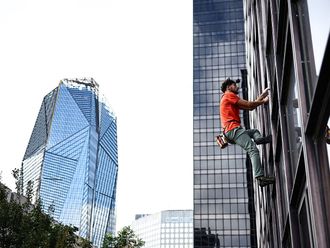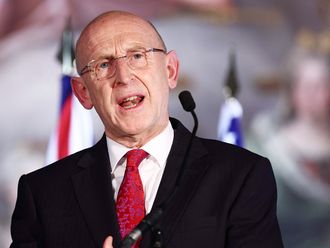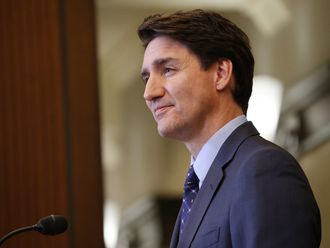
London: After a week when protesters battled with police outside his residence, spray-painted “racist” on a memorial to Winston Churchill and dumped the statue of a 17th-century slave trader into Bristol harbour, Prime Minister Boris Johnson knew he was going to face questions about race and justice in Parliament.
Yet, standing in the chamber on Wednesday, Johnson seemed nonplussed when a lawmaker from the opposition Scottish National Party, Kirsty Blackman, condemned President Donald Trump’s response to the police killing of George Floyd, a black man in Minneapolis, and asked Johnson if he still believed his assertion that Trump had “many, many good qualities.”
“Yes, black lives matter,” he replied, “and yes, the death of George Floyd was absolutely appalling.” As for Trump, the prime minister said, he is the president of the United States, Britain’s most important ally, which is “a bastion of peace and freedom, and has been, for most of my lifetime.”
Johnson’s statement landed with a thud - and not just because Parliament was sparsely populated as part of coronavirus-related social distancing measures. At a time when the unrest in the United States is prompting many in Britain to ask questions about racial injustice in their society, the prime minister is still struggling to find his voice.
As with his response to the virus, Johnson was late to address the protests that erupted in London and other cities after the death of Floyd. And when he did, he oscillated between a hard message of authority and a more conciliatory tone: strident calls for law and order followed by promises to listen to the anguish of black Britons and other minorities.
Critics and defenders
For some critics, there is little difference between Johnson and Trump. “You’ve got a bad guy on both sides of the Atlantic,” said Kehinde Andrews, a professor of black studies at Birmingham City University.
Unlike Trump, Johnson has not used tear gas to break up the demonstrations outside the prime minister’s residence at No. 10 Downing St. He has not propagated conspiracy theories about the motives of the protesters. And he regularly invokes the phrase, “black lives matter,” which Trump has not done.
Defenders of Johnson argue that when he was mayor of the London, he pushed for people from ethnic minority groups to be promoted in the Metropolitan Police. Ray Lewis, a Guyana-born adviser who worked with him as mayor, said Johnson had a genuine interest in working to improve the lives of young people from the Afro-Caribbean community.
More recently, Lewis said, Johnson has spoken privately of his anger over the Windrush scandal, in which Caribbean and other immigrants were wrongly detained and, in some cases, deported from Britain in 2018.
“He, like most other people from privileged circumstances, responds to the world according to how he has been brought up,” said Lewis who is chief executive of Eastside Young Leaders’ Academy, an organisation he founded to help Afro-Caribbean boys in east London. “I have about as much in common with him as I do with Vladimir Putin, and yet there was a kind of connection.”
‘Crowd pleaser’
“Is he racist?” said Sonia Purnell, a British journalist who wrote a critical biography of Johnson. “Probably not.”
Instead, Purnell, who is white, said Johnson tailors his statements to please his audience. As a columnist for the right-leaning Daily Telegraph, his slurs against black people drew little blowback. As the leader of a right-wing Conservative government, his call for law and order after the protests appealed to his political base.
“He is a crowd pleaser,” Purnell said, “so the question is, what crowd is he pleasing?”
In the early days of the pandemic, Johnson resisted unpopular measures like shutting down pubs. As a result, Britain imposed a lockdown later than its European neighbors. Neil Ferguson, an influential epidemiologist at Imperial College London, told a Parliamentary committee on Wednesday that if Britain had acted a week earlier, it would have cut its current death toll of 41,000 in half.
Johnson’s reluctance to order a full lockdown also reflects his instinctive aversion to government interference, the “nanny state” he often lampooned as a journalist.
“He wants folks to have fun,” said Tim Bale, a professor of politics at Queen Mary, University of London. “But I’m afraid that we are in a situation where folks can’t have fun, and he finds that difficult.”












